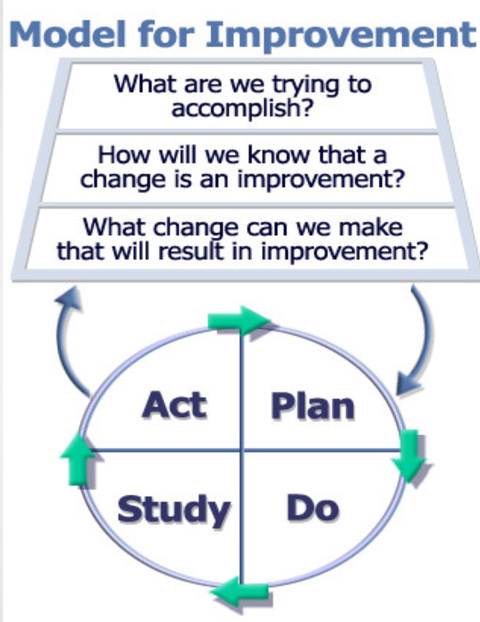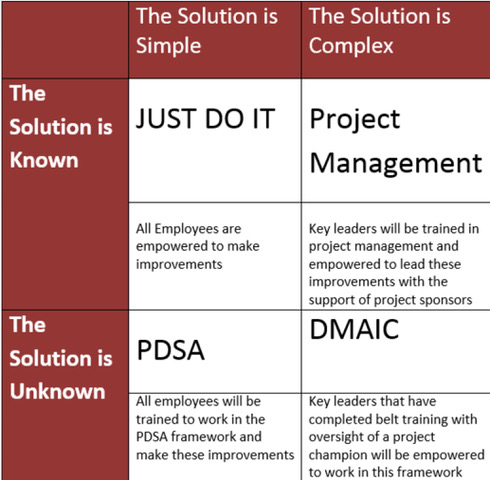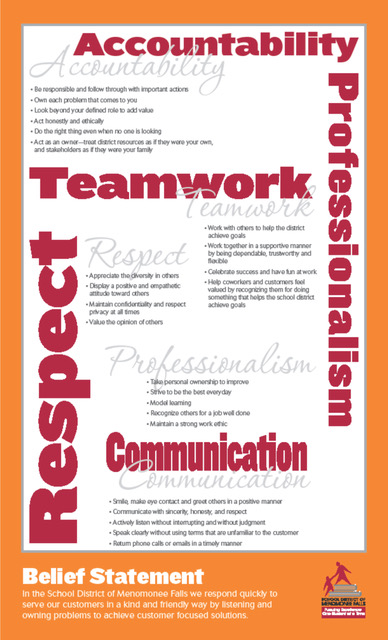Lighting the Path to Improvement: Hope is not Strategy & Accountability is not Commitmentby Patricia Greco, Ph.D., Superintendent School District of Menomonee Falls We all know improving schools and systems is hard. High stakes accountability and the initiative swirl have failed to lead to lasting improvement. Every educator went into our profession wanting to make a difference. Each child enters kindergarten full of promise wanting to succeed. Leaders, formal and informal, accept the challenge to lead because they believe they can impact both positive change and organization culture. So why do we fail to pull it together as a field? How do we reshape our thinking about our real work? We are not leading initiatives. We are leading complex organizations full of human decision making. In most communities, the school district is the largest employer. Deming, the godfather of continuous improvement, stated an organization with 500 employees makes 4 million decisions a day. Organizational outcomes and success depend on the alignment of all of them. The challenge in our field is we understand systems thinking and quality tools at the 50,000 ft. level. We learn about systems and transformational change. What’s been missing? We struggle gaining access to the principles, tools and processes of improvement. The skillset we need as a field to move people and organizations forward. I wish I had found this work much earlier in my career. I always felt I was a committed educator. Now I know our leadership is impacting organizational results and improving outcomes for students, staff, leaders, our board and our community. This work has changed my thinking, the capacity of my personal leadership, and my ability to support the leaders throughout our organization. I look forward to sharing what we have learned with those attending the AWSA meeting in March. Evidence Based Leadership (Studer Education) linked with the principles of quality and Model for Improvement (Bryk) have moved our team beyond “the chase.”
Our full system is now focused on building an improving culture. We problem solve effectively and leverage capacity for both the students and the staff. Our performance results are clearly stronger. We aren’t improving because we have to for public accountability. We are improving because our core principles drive our shared decision making and collective actions. Nine Principles of Improvement
(Studer Education) Our beliefs are aligned to service to others. We have expertly skilled leaders at every level (teachers, support staff, facilities, food service, operations, leadership and board) of our organization. We have learned the tools and principles of continuous improvement. It is easy to blame people for poor performance. The real work of any improving system rests in the team’s ability to build individual capability, develop system capacity, and understand the bright spots well enough to know how to spread work that is already producing strong outcomes across the system. We own the responsibility of building life chances for children and bridging new hope for our professionals. Yet, few leaders in education are really skilled to do this well. We are responsible for changing mindsets and behaviors. We must remove barriers for students and staff, solve problems and improve outcomes…simple….right? So how can we and our field get there? We must become masters of organizational development, change, quality and Improvement Science. Students, staff and leaders need to be skilled in deploying the Plan, Do, Study, Act process. Educators are already masters of plan and do. None of us need more to plan or do. Few of us stop “chasing” long enough to study the impact of what they are doing and act based on the real results.
Dr. Tony Bryk is the President of the Carnegie Foundation at Stanford University. Dr. Bryk artfully explains how the measures for accountability are not the measures for improvement. Accountability is short sighted and limiting. A focus on compliance or a score in a newspaper will never drive student learning or improvement of a system. Improvement requires disciplined, skilled decision making, frequent monitoring of what is important to student and organizational success, and deep development in the problem-solving process. We have wicked problems to solve. We need the skills to match the problems we are trying to tackle.
Our full team and leadership development is focused on the tools needed to improve. All staff are trained in team excellence and service excellence. Studer Education has been a key partner in developing our leadership capacity across all of our work teams. Our Service Excellence standards were designed by staff and serve as the baseline for our always actions as a team and our individual evaluation system.
All students and staff are skilled in the Plan Do Study Act Process. Our internal improvement specialists support all staff members on designing their classroom system of improvement. Students provide feedback to their teachers every 10-15 days on the strategies that are helping them learn. Students set goals for their next learning cycle based on their classroom performance. Teachers use student feedback to redesign their instruction and monitor growth. Our teacher leaders, improvement specialists, reading and math intervention teachers, curriculum leaders, and administrators are all certified in Project Management. We are trained in the tools of Decision Analysis, Situation Analysis, Problem Analysis, and Opportunity Analysis. We know how to assess root cause and plan our actions in 45-day cycles to determine if our predictions are taking us in the right direction. Dr. Joe Weitzer and the team at The Center for Business Performance Solutions at Waukesha County Technical College have been key partners in our ongoing skill development. We are dedicated students of Improvement Science, Continuous Improvement, and Evidence-Based Leadership. The School District of Menomonee Falls hosts two Improvement Visits per year each March and November. We welcome you to join our team. We want to share what we have learned about Improvement. We believe in the power of educators and leaders to make a difference in the lives of students. Together, we can change the image of our field and ultimately outcomes for our communities. I want to thank Dr. Jon Bales, Dr. Joe Schroeder and Tammy Gibbons for starting this journey across the WASDA and AWSA community. I look forward to seeing everyone at the Data Summit in March! Dr. Patricia Greco will be one of the keynote speakers at this year's Wisconsin Summit for Data-Informed Leadership. The summit will take place March 1-2, 2018 in Green Bay.
|




